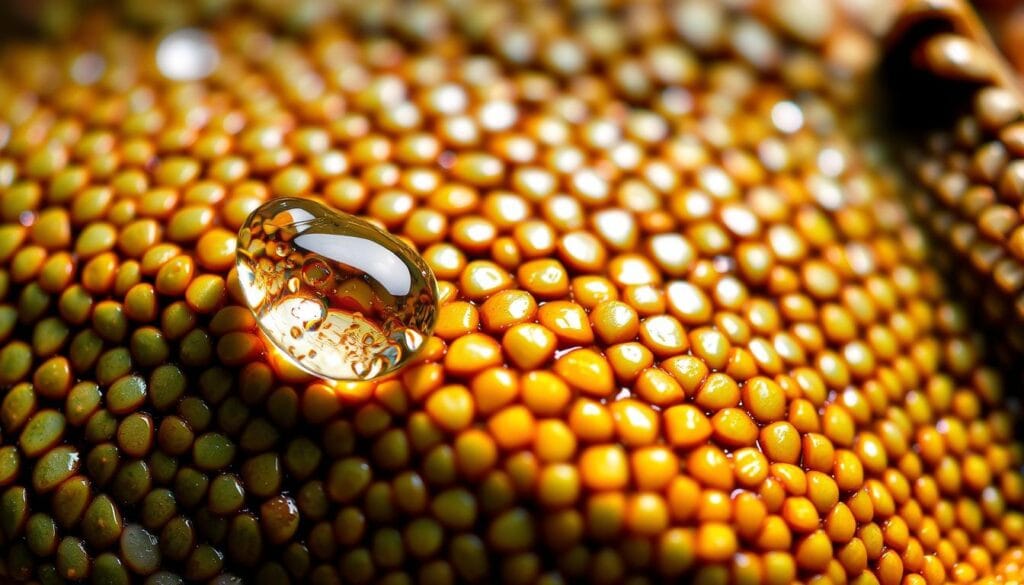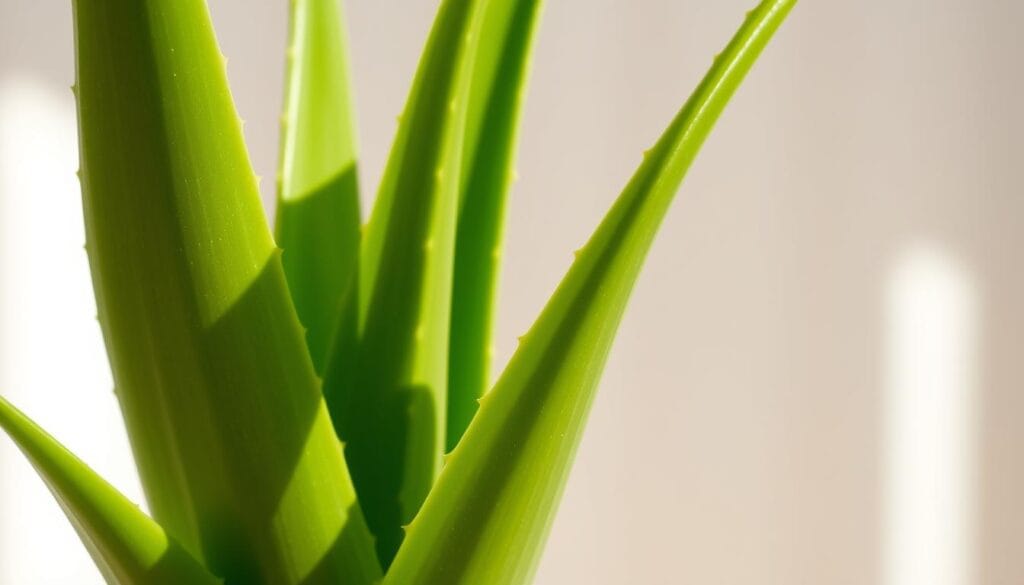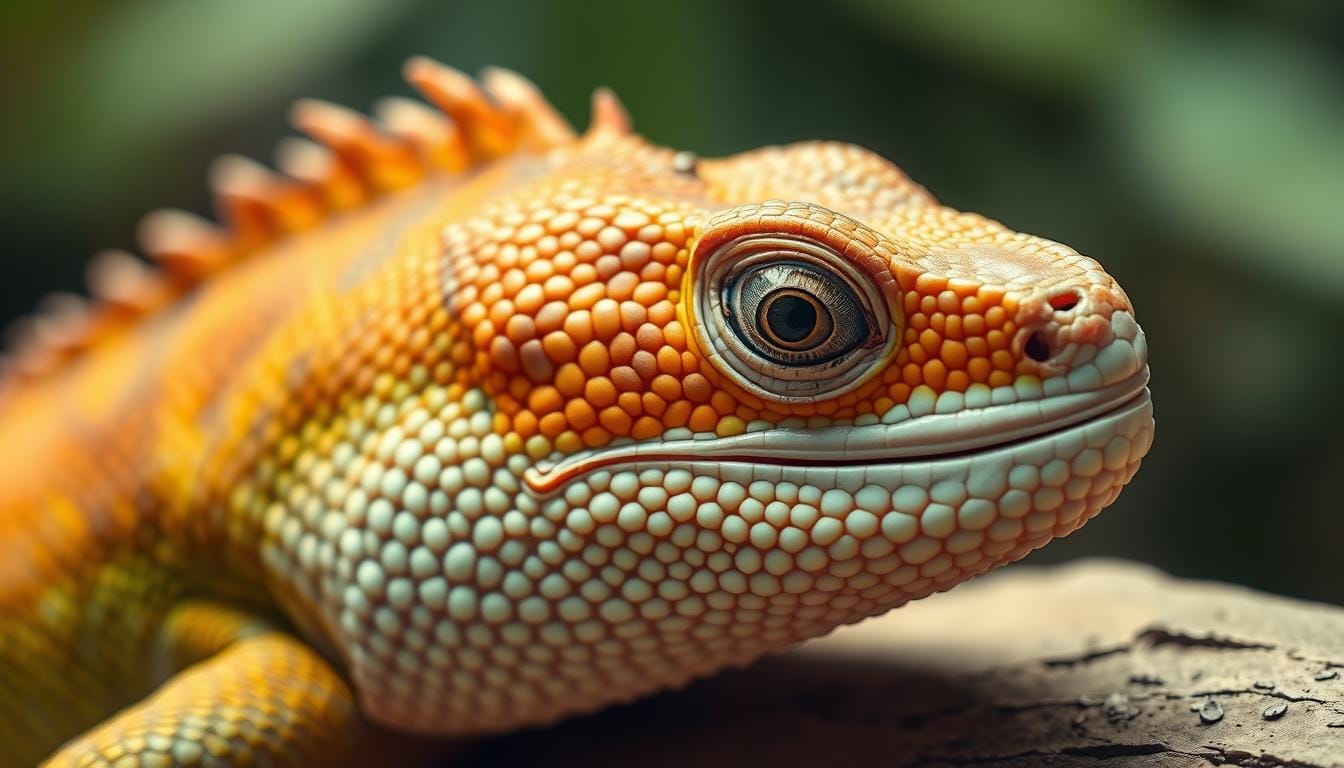If you own a reptile, you care deeply about their health. Their skin condition is a key sign of their health. Keeping their skin healthy is essential for their well-being.
Nurturing your reptile’s skin health is more than just a good environment. It needs a careful approach to care. By using holistic approaches, you can greatly improve their skin, making their life better.
Knowing the right methods is crucial. This guide will show you how to improve your reptile’s skin health. We focus on gentle and sustainable ways.
Table of Contents
Understanding Reptile Skin Health
The skin of your reptile is more than just a shield. It’s a key to their health. As they grow, reptiles shed their skin, a vital process. But, this can sometimes lead to problems like retained shed or skin infections.
The Importance of Skin for Reptiles
Reptile skin protects them from the environment, helps control water loss, and regulates body temperature. A healthy skin barrier is crucial for preventing infections and ensuring your reptile can thrive. It also helps with camouflage and behavior, making skin health essential for their well-being.
Knowing how important skin health is can help you care for your reptile better. Keeping the right humidity level helps prevent dehydration and aids in shedding. Also, a clean, bacteria-free enclosure reduces the chance of skin infections.
Common Skin Issues in Reptiles
Reptiles face many skin problems, like shedding issues, infections, and dry skin. Shedding problems can occur due to inadequate humidity or poor nutrition, leading to retained shed. This can cause discomfort and more problems. Infections come from bacteria or fungi, often due to dirty enclosures or injuries.
Using herbal solutions for reptile skin issues or organic treatments for reptile skin problems can help. Some herbs have natural antifungal and antibacterial properties. A balanced diet and proper environment are also key to preventing skin issues.
Benefits of Natural Remedies
Natural remedies are a great choice for your reptile’s skin care. They offer a safer, more sustainable way to keep your pet healthy.
Why Choose Natural Over Synthetic?
Natural remedies are gentler and have fewer side effects than synthetic ones. This is because they match your reptile’s biology better, reducing the chance of bad reactions.
- Gentle on the skin: Natural remedies are kinder, making them safe for long-term use.
- Fewer chemicals: Choosing natural means less exposure to harsh chemicals for your pet.
- Holistic health benefits: Many natural remedies do more than just care for the skin, they offer extra health perks.
Eco-Friendly Options for Your Reptile
Going for eco-friendly, natural remedies is good for your reptile and the planet. It shows you care about responsible pet care and the environment.
- Coconut oil: It’s moisturizing and has natural antibacterial properties.
- Aloe vera: It’s a natural healer that soothes and calms irritated skin.
- Calendula: It has healing properties that help damaged skin recover.
Using these natural, eco-friendly remedies can improve your reptile’s skin health. It also supports a greener lifestyle.
Essential Vitamins and Minerals
Vitamins and minerals are key for your reptile’s skin health. They play a big role in their overall well-being. Without them, your pet might face skin problems, affecting their life quality.
Key Nutrients for Healthy Skin
Some vitamins and minerals are more important for reptile skin. Vitamin D3 helps with calcium absorption and skin health. Calcium is vital for skin and scale growth. Other important ones are vitamin A for skin regeneration and zinc for wound healing and skin strength.
- Vitamin D3: crucial for calcium absorption and skin health
- Calcium: essential for skin and scale development
- Vitamin A: supports skin regeneration
- Zinc: aids in wound healing and skin integrity
Sources of Vitamins and Minerals
Reptiles get these nutrients from their diet and environment. A balanced diet is crucial. Leafy greens give vitamin A, and calcium supplements help with calcium. Also, UVB lighting is key for vitamin D3 in many reptiles.
For natural remedies for reptile skin health, a holistic approach is best. This includes a balanced diet, proper environment, and supplements when needed. Knowing about these nutrients helps you care for your reptile’s health in a natural way.
Hydration and Its Role in Skin Health
Keeping your reptile hydrated is key to their skin health. Dehydration can cause dryness, scaling, and even serious health problems. It’s crucial for their well-being.
Maintaining Optimal Hydration Levels
Make sure your reptile always has clean, fresh water. Change the water often to stop bacteria from growing. Also, keep an eye on the humidity in their habitat and adjust it as needed.
Humidity levels differ for each reptile species. Tropical ones need more humidity than desert ones. Knowing your reptile’s humidity needs is important.
Methods to Ensure Hydration
There are ways to keep your reptile hydrated. Provide a clean water source and:
- Mist their enclosure more often, for humid-loving species.
- Use a water bowl large enough for them to soak in, as some absorb water through their skin.
- Try herbal solutions like aloe vera in their water or on their skin.
By keeping them hydrated and using herbal solutions for reptile skin issues, you can greatly improve their skin health. This will make them happier and healthier.

Natural Oils for Skin Moisture
Natural oils are great for reptile skin. They help with hydration and healing. These oils can fix dryness and irritation, common issues for reptile owners.
Coconut Oil: Benefits and Application
Coconut oil is known for its moisturizing effects. You can put it directly on the reptile’s skin. It helps keep moisture in and soothes dry spots.
Benefits of Coconut Oil:
- Hydrates the skin
- Reduces inflammation
- Antimicrobial properties
Olive Oil: Uses for Reptile Skin
Olive oil is also good for reptile skin. It’s full of antioxidants and nourishes the skin.
Uses of Olive Oil:
- Nourishes dry skin
- Protects against environmental stressors
- Promotes healthy skin regeneration
Here’s a comparison of coconut and olive oil for reptile skin care:
| Oil Type | Benefits | Application |
|---|---|---|
| Coconut Oil | Hydrates, reduces inflammation, antimicrobial | Direct application to dry skin areas |
| Olive Oil | Nourishes, protects, promotes regeneration | Massage into skin, use as part of a skin care routine |
When using natural oils for your reptile’s skin, choose high-quality, organic products. This ensures the best results. Always talk to a vet before starting any new skin care routine.
Using Herbs for Skin Health
Herbs have been used for natural healing for centuries. They are great for reptile skin health too. Many reptile owners use herbal remedies instead of synthetic treatments for skin problems.
Aloe Vera: A Natural Healer
Aloe Vera is famous for its soothing and healing effects. It helps treat many skin irritations and conditions in reptiles.
Benefits of Aloe Vera:
- Soothes skin irritations
- Promotes healing
- Hydrates the skin

Calendula: Healing Properties
Calendula, also known as marigold, is great for reptile skin health. It has anti-inflammatory and antimicrobial properties. These make it a good treatment for many skin issues.
“Calendula’s healing properties have been used for centuries in traditional medicine. It’s a valuable resource for reptile care.”
Key Benefits of Calendula:
| Benefit | Description |
|---|---|
| Anti-inflammatory | Reduces swelling and pain |
| Antimicrobial | Fights against microbial infections |
| Promotes healing | Enhances the recovery process |
Adding these herbs to your reptile’s care routine can help with skin health. It’s a natural and holistic way to care for your reptile.
Diet Adjustments for Healthier Skin
Changing your reptile’s diet can greatly improve their skin health. A diet full of essential nutrients helps keep them healthy and vibrant. It’s key for maintaining their skin.
First, learn what your reptile needs to eat. Each species has its own dietary needs. It’s crucial to find out what your pet needs.
Nutrient-Rich Foods to Include
Adding the right foods to your reptile’s diet can boost their skin health. Leafy greens are packed with vitamins and minerals good for the skin. Fresh fruits add antioxidants that are vital.
| Food Type | Nutritional Benefits | Examples |
|---|---|---|
| Leafy Greens | Rich in Vitamins A, C, and K | Kale, Collard Greens, Mustard Greens |
| Fresh Fruits | High in Antioxidants and Fiber | Berries, Melons, Apples |
| Protein Sources | Essential for Skin Repair | Crickets, Mealworms, Pinkie Mice |
Foods to Avoid for Optimal Skin
Knowing what not to feed your reptile is just as important. Some foods can cause nutritional imbalances or even be toxic. This can harm their skin health.
Limit or avoid high-protein commercial foods, as they can harm the kidneys. Also, steer clear of fruits high in sugar. Always check the dietary needs and restrictions for your reptile species.
The Role of Environment in Skin Care
Creating a good environment is key for your reptile’s health, including their skin. The place they live can help their skin stay healthy or cause problems.
Proper lighting and humidity levels are very important. Reptiles need certain light to stay healthy, including UVB light for vitamin D3. This helps their skin. You can learn more about this in our guide on natural reptile skin care.
Proper Lighting and Humidity Levels
Keeping the right humidity is also crucial. Some reptiles, like bearded dragons, like it dry. Others, like snakes and turtles, need it more humid. The right humidity helps prevent dehydration and helps with shedding.
Experts say, “Reptiles need specific environments to stay healthy.”
“The right environment is key to a reptile’s health, including the health of their skin.”
Safe Habitat Cleaning Practices
Cleaning their habitat safely is also important. Regular cleaning stops bacteria and fungi from causing infections. Use reptile-safe cleaners and clean everything well.
For more tips on keeping your reptile’s environment healthy, check out Exotic Pet Haven. They offer lots of advice on caring for exotic pets.
By managing these environmental factors, you can greatly improve your reptile’s skin health. Keep an eye on their environment and make changes as needed. This will help your reptile stay healthy and happy.
Recognizing When to Seek Professional Help
Knowing when your reptile needs a vet can make a big difference. You’ve learned about natural remedies and care. But, there are times when professional help is necessary for your reptile’s health.
Signs of Serious Skin Conditions
Watching your reptile’s skin health is key. Look out for persistent shedding issues, unusual discoloration, or visible infections. If you see these signs, get your reptile to the vet fast. For more on reptile health, check out this resource.
- Severe or prolonged shedding difficulties
- Visible signs of infection or abscesses
- Changes in skin color or texture
Finding a Vet Specializing in Reptiles
Not every vet knows about reptiles. Look for one with reptile experience. Ask other reptile owners, check online, or ask pet associations for a vet.
A reptile-specializing vet can give you expert guidance on holistic approaches for reptile skin care. This includes natural remedies, diet, and environment. Being proactive is part of a holistic care strategy.
DIY Natural Skin Treatment Recipes
You can make natural treatments at home for your reptile’s skin. Use natural ingredients to create treatments that meet your pet’s needs. This keeps their skin healthy and looking good.
Simple Recipes for Home Use
Making natural skin treatments at home is easy and saves money. Here are a couple of simple recipes to start with:
- Aloe Vera and Coconut Oil Blend: Mix aloe vera gel with coconut oil. This makes a soothing treatment that moisturizes and heals the skin.
- Calendula Salve: Mix calendula oil with beeswax. This creates a protective salve that helps fix damaged skin.
These recipes use the natural healing powers of their ingredients. They provide great skin care for your reptile.
Application Tips for Best Results
To get the best results from these treatments, apply them correctly. Here are some tips:
- Clean the Skin: Before applying, gently clean the affected area with a mild soap solution.
- Gently Apply: Use a soft cloth or cotton swab to apply the treatment. Be careful around sensitive areas.
- Monitor and Adjust: Watch how your reptile reacts to the treatment. Make changes if needed.
By following these tips, you can get the most out of your homemade natural skin treatments.
Maintaining Overall Health for Skin Longevity
To keep your reptile’s skin healthy, focus on their overall well-being. Proper care, nutrition, and environment are key. They all help keep the skin in good shape.
Check-Ups and Preventative Care
Regular vet visits can spot skin issues early. Keeping their habitat clean and feeding them right is also important. Looking into organic treatments can help too.
Stress Management for Reptiles
Stress affects your reptile’s health, including their skin. Using alternative therapies like a good environment and less handling stress is helpful. This can lead to healthier skin and a longer life.
By following these care tips, your reptile’s skin will stay healthy. A complete care approach leads to a long, happy life for them.

